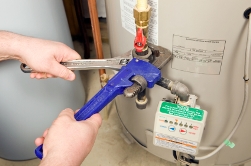Points to Ask Plumber Technical Schools

When you have decided to obtain a certificate, diploma or degree, you can begin to narrow down your training options. Considering that there are so many plumbing tech and trade schools in the Boise ID area, it's imperative to have a checklist of criteria that each school must satisfy. The initial 2 that we talked about were location and tuition expense. And while both qualifiers may be critical when making your determination, there are additional variables that need to be considered as well. Following is a checklist of those additional qualifiers that you will need to research before selecting a plumber tech school.
Is the Plumbing School Accredited? Many plumbing trade programs have received either a regional or a national accreditation. They can receive Institutional Accreditation, which focuses on the school's programs as a whole, or Programmatic Accreditation, which relates to an individual program, such as electrical technology. Verify that the Boise ID school and program are accredited by a U.S. Department of Education approved accrediting agency, such as the Accreditation Board for Engineering and Technology. In addition to helping guarantee that you receive a superior education, it can assist in acquiring financial assistance or student loans, which are in many cases unavailable for non-accredited programs. Furthermore, a number of states require that the plumbing training program be accredited in order to be approved for certification or licensing.
Is the Plumbing School Licensed? Along with accreditation, an additional way of determining if a trade school you’re considering is reputable is by making sure that it’s properly licensed. Licensing is typically regulated and controlled by state agencies, such as the Idaho Department of Education. If you don’t know, ask the school which state agency is responsible for its licensing and then check to ensure that it’s up to date.
How Long has the School been in Business? Another means of determining the quality of a technical school is to find out how long it’s been in business. The longer a school has been in operation, the more likely that its programs are highly rated and regarded. Conversely, schools that are not well regarded or that provide low quality training generally don’t stand the test of time. However, keep in mind that even the best of Boise ID schools had to start from their first day of operation, so only use it as one of several qualifications for each school you are considering.
What are the School’s Completion and Placement Rates? Ask the plumbing training programs you are looking at what their completion rates are. The completion rate is the percentage or portion of students who enroll in and complete the course. A lower completion rate might indicate that students were dissatisfied with the course and quit. It may also mean that the teachers were not competent to train the students. It's similarly essential that the schools have high job placement rates. Older and/or more reputable schools may have a broader directory of alumni, which can produce more contacts for the school to use for their apprenticeship and job placement programs. A high job placement rate can not only confirm that the school has an excellent reputation within the industry, but also that it has the network of contacts to help grads acquire apprenticeships or jobs in the Boise ID area.
Are Apprenticeship Programs Sponsored? Most plumber technical programs are taught together with an internship or an apprenticeship program. Those participating vocational and trade schools will help place you in an apprenticeship program within their network of plumbing contractors or trade unions. Find out if the schools you are considering have referring partnerships with local Boise ID plumbers or plumbing professionals. An apprenticeship not only provides a rewarding experience by furnishing hands-on training, but it also furnishes employment opportunities and helps to establish relationships in the regional plumbing professional community.
Are there Modern Facilities? Make sure that the school facilities and the equipment that you will be instructed on are state-of-the-art and what you will be working with on the job. If you are presently in an internship or an apprenticeship, talk to the master plumber you are working with regarding what you should be looking for. Otherwise, ask a local Boise ID plumbing contractor if they can provide some tips.
Where is the School Located? Unless you can relocate, the school must be within commuting distance of your Boise ID home. Remember that if you decide to enroll in an out-of-state school, besides the added moving costs there might be increased tuition fees compared to in-state residents.
Are there Smaller Classes? It's desirable that you get as much individualized instruction as possible, which can be difficult in bigger classes. Ask if you can sit in on a couple of the classes so that you can observe how large they are and witness first hand the interaction between students and teachers. Talk to a few of the students and get their feedback relating to class sizes and instruction. Last, talk with a few of the instructors and find out what their level of experience is in Boise ID and what certifications or degrees they hold.
Is the Class Schedule Convenient? Confirm that the class schedules for the schools you are reviewing are flexible enough to fulfill your needs. If you are only able to go to classes at night or on weekends near Boise ID, confirm that the schools you are comparing provide those options. If you can only attend part-time, make certain that the school you select permits part-time enrollment. Also, check out what the policy is to make-up classes should you miss any because of work, sickness or family emergencies.
